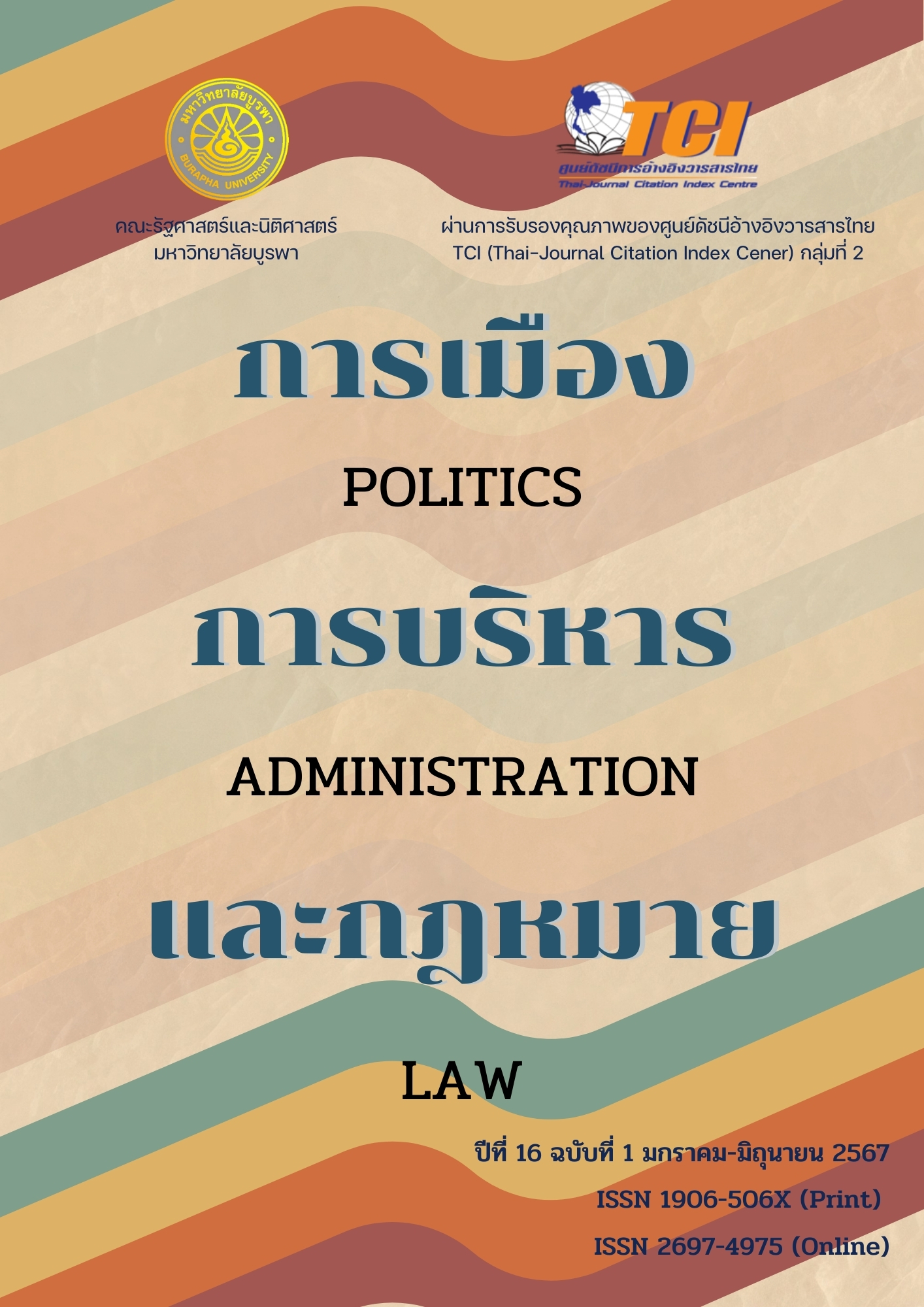Evaluating the Structural Dimensions of Trust in Supervisors at Thai Universities Using SmartPLS
Keywords:
Confirmatory Factor Analysis, Thai Universities, Trust in SupervisorsAbstract
This study validated the Trust in Supervisors scale using Covariance-Based Structural Equation Modeling (CB-SEM) via SMARTPLS software, analyzing data from 215 employees at nine Thai universities. The focus was on the Trust in Supervisors construct and its components - Ability, Benevolence, and Integrity. Confirmatory Factor Analysis (CFA) demonstrated a robust measurement model with high factor loadings, excellent internal consistency reliability, and substantial average variance extracted (AVE). Discriminant validity confirmed the distinctiveness of the constructs, enhancing the theoretical framework's credibility. Structural model analysis revealed significant relationships between Trust in Supervisors and employees' perceptions of supervisors' competencies, goodwill, and integrity, underscoring trust's role in fostering positive organizational climates and enhancing employee well-being and performance. Despite limitations such as geographical and sectoral specificity and the cross-sectional nature of the data, this study advances the understanding of trust dynamics in organizations. Future research should explore trust-related phenomena longitudinally across diverse settings and incorporate qualitative methods for deeper insights into trust formation and its organizational implications.
References
Afsar, B., Shahjehan, A., & Shah, S. I. (2018). Frontline employees’ high-performance work practices, trust in supervisor, job-embeddedness and turnover intentions in hospitality industry. International Journal of Contemporary Hospitality Management, 30(3), 1436-1452.
Charoensukmongkol, P. (2021). How Chinese expatriates’ cultural intelligence promotes supervisor-subordinate Guanxi with Thai Employees: The mediating effect of expatriates’ benevolence. International Journal of Cross Cultural Management, 21(1), 9-30.
Cho, Y. J., & Lee, J. W. (2012). Performance management and trust in supervisors. Review of Public Personnel Administration, 32(3), 236-259.
Chughtai, A., Byrne, M., & Flood, B. (2015). Linking ethical leadership to employee well-being: The role of trust in supervisor. Journal of Business Ethics, 128(3), 653-663.
Colquitt, J. A., Scott, B. A., & LePine, J. A. (2007). Trust, trustworthiness, and trust propensity: a meta-analytic test of their unique relationships with risk taking and job performance. Journal of Applied Psychology, 92(4), 909.
Couper, M. P. (2000). Web surveys: A review of issues and approaches. The Public Opinion Quarterly, 64(4), 464-494.
Cronbach, L. J. (1951). Coefficient alpha and the internal structure of tests. Psychometrika, 16(3), 297-334.
Dirks, K. T., & Ferrin, D. L. (2002). Trust in leadership: meta-analytic findings and implications for research and practice. Journal of Applied Psychology, 87(4), 611-628.
Fornell, C., & Larcker, D. F. (1981). Evaluating structural equation models with unobservable variables and measurement error. Journal of Marketing Research, 18(1), 39-50.
Hair Jr, J. F., Matthews, L. M., Matthews, R. L., & Sarstedt, M. (2017). PLS-SEM or CB-SEM: updated guidelines on which method to use. International Journal of Multivariate Data Analysis, 1(2), 107-123.
Henseler, J., Ringle, C. M., Sarstedt, M. (2015). A New Criterion for Assessing Discriminant Validity in Variance-based Structural Equation Modeling. Journal of the Academy of Marketing Science, 43(1), 115-135.
Hu, L. T., & Bentler, P. M. (1999). Cutoff criteria for fit indexes in covariance structure analysis: Conventional criteria versus new alternatives. Structural Equation Modeling: A Multidisciplinary Journal, 6(1), 1-55.
Kouzes, J. M., & Posner, B. Z. (2010). The five practices of exemplary leadership. John Wiley & Sons.
Likert, R. (1932). A technique for the measurement of attitudes. Archives of psychology.
Mayer, R. C., Davis, J. H., & Schoorman, F. D. (1995). An integrative model of organizational trust. Academy of Management Review, 20(3), 709-734.
Nienaber, A. M., Romeike, P. D., Searle, R., & Schewe, G. (2015). A qualitative meta-analysis of trust in supervisor-subordinate relationships. Journal of Managerial Psychology, 30(5), 507-534.
Nunnally, J. C. (1978). An overview of psychological measurement. In B. B. Wolman (Ed), Clinical diagnosis of mental disorders: A handbook (pp. 97-146). Springer.
Pasupuleti, S., Lambert, E. G., Srinivasa, S. R., Cluse-Tolar, T., & Jiang, S. (2024). The importance of organizational justice on job burnout among midwestern US social workers. Studies in Clinical Social Work: Transforming Practice, Education and Research, 94(1), 67-89.
Presser, S., Couper, M. P., Lessler, J. T., Martin, E., Martin, J., Rothgeb, J. M., & Singer, E. (2004). Methods for testing and evaluating survey questions. Wiley.
Ringle, C. M., Wende, S., & Becker, J. M. (2015). SmartPLS 3. SmartPLS GmbH, Boenningstedt. Journal of Service Science and Management, 10(3), 32-49.
Schoorman, F. D., Mayer, R. C., & Davis, J. H. (2007). An integrative model of organizational trust: Past, present, and future. Academy of Management Review, 32(2), 344-354.
Srivastava, U. R., & Mohaley, S. (2022). Role of trust in the relationship between authentic leadership and job satisfaction and organizational commitment among Indian bank employees. American Journal of Industrial and Business Management, 12(4), 616-664.
Sue, V.M., & Ritter, L.A. (2012) Conducting online surveys. SAGE.
Tyler, T. R., & Blader, S. L. (2003). The group engagement model: Procedural justice, social identity, and cooperative behavior. Personality and Social Psychology Review, 7(4), 349-361.
Wasti, S. A., Tan, H. H., Brower, H. H., & Önder, Ç. (2007). Cross-cultural measurement of supervisor trustworthiness: An assessment of measurement invariance across three cultures. The Leadership Quarterly, 18(5), 477-489.
Wright, K. B. (2005). Researching Internet-based populations: Advantages and disadvantages of online survey research, online questionnaire authoring software packages, and web survey services. Journal of Computer-mediated Communication, 10(3), JCMC1034.
Zeffane, R., Melhem, S., & Baguant, P. (2018). The impact of job satisfaction, trust, gender and supervisor support on perceived organisational performance: An exploratory study in the UAE service sector. International Journal of Business Excellence, 14(3), 339-359.
Downloads
Published
Issue
Section
License

This work is licensed under a Creative Commons Attribution-NonCommercial-NoDerivatives 4.0 International License.






